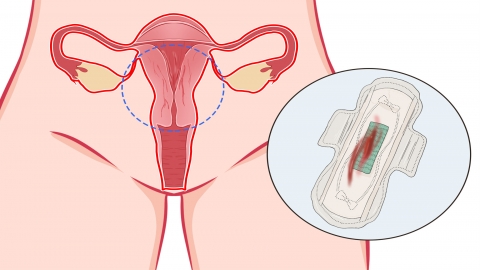Why isn't my period coming if I'm not pregnant?
Generally, the main reasons for absence of menstruation despite not being pregnant include high levels of stress, irregular sleep patterns, polycystic ovary syndrome, hyperprolactinemia, and endometrial adhesions. If discomfort occurs, it is recommended to seek timely medical evaluation and treatment at a reputable hospital. Specific explanations are as follows:
1. High Stress Levels
Long-term anxiety and tension can disrupt the hypothalamic-pituitary-ovarian axis, leading to hormonal imbalances and menstrual cycle disturbances. Stress can be alleviated through exercise, listening to music, maintaining emotional stability, adhering to regular作息 (daily routines), avoiding excessive fatigue, and seeking psychological counseling when necessary.

2. Irregular Sleep Patterns
Chronic late-night sleeping and reversed day-night cycles disrupt circadian rhythms, affecting the secretion of estrogen and progesterone, which may lead to delayed or absent menstruation. Adjust sleep schedules by ensuring 7–8 hours of sleep per night, maintaining consistent bedtimes and wake-up times, avoiding electronic devices before bedtime, and improving overall endocrine function.
3. Polycystic Ovary Syndrome (PCOS)
Ovarian dysfunction leads to excessive androgen production and impaired follicular development, resulting in infrequent menstruation or amenorrhea, often accompanied by hirsutism and obesity. Medications such as drospirenone ethinyl estradiol tablets, spironolactone tablets, and metformin hydrochloride tablets may be prescribed under medical supervision. Weight management, dietary adjustments, and reduced intake of high-sugar and high-fat foods are also recommended.
4. Hyperprolactinemia
Excessive prolactin secretion by the pituitary gland suppresses ovulation and hormone production, causing amenorrhea, often accompanied by galactorrhea (milky nipple discharge). Treatment may include medications such as bromocriptine mesylate tablets, vitamin B6 tablets, or cabergoline tablets under medical guidance. Avoid prolonged breast stimulation, minimize psychological stress, and regularly monitor prolactin levels.
5. Endometrial Adhesions
Injury and adhesion of the endometrium caused by uterine procedures or infections can impair endometrial shedding, leading to absent menstruation and possibly cyclical abdominal pain. Under medical supervision, estradiol valerate tablets may be used to promote endometrial repair. In severe cases, hysteroscopic adhesiolysis may be required, followed by intrauterine device (IUD) placement to prevent re-adhesion.
In daily life, it is important to maintain positive emotional health and avoid excessive stress; adhere to regular sleep schedules and avoid staying up late; eat a balanced diet to ensure adequate nutrition; and undergo regular gynecological check-ups to detect hormonal or uterine abnormalities early, preventing delayed treatment.





